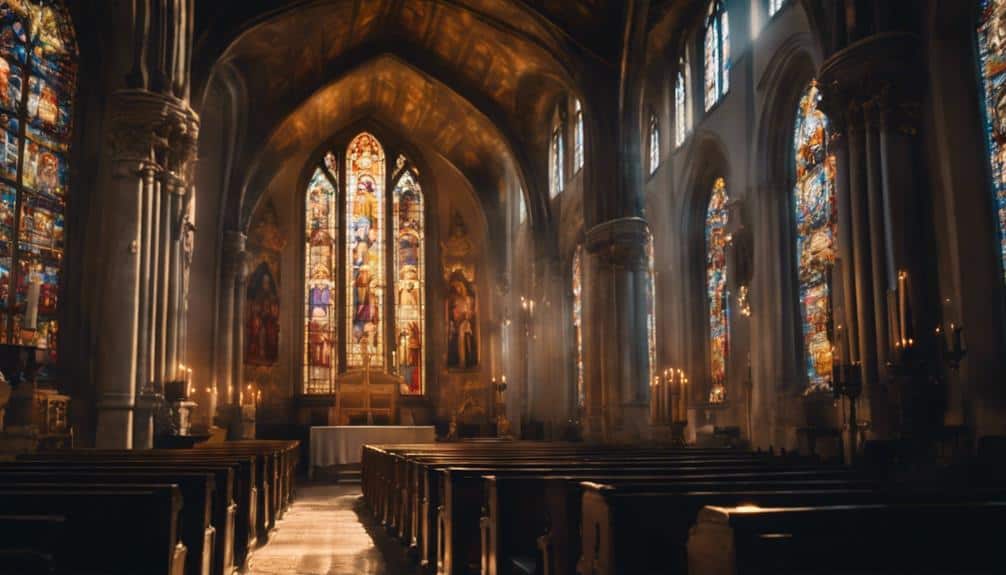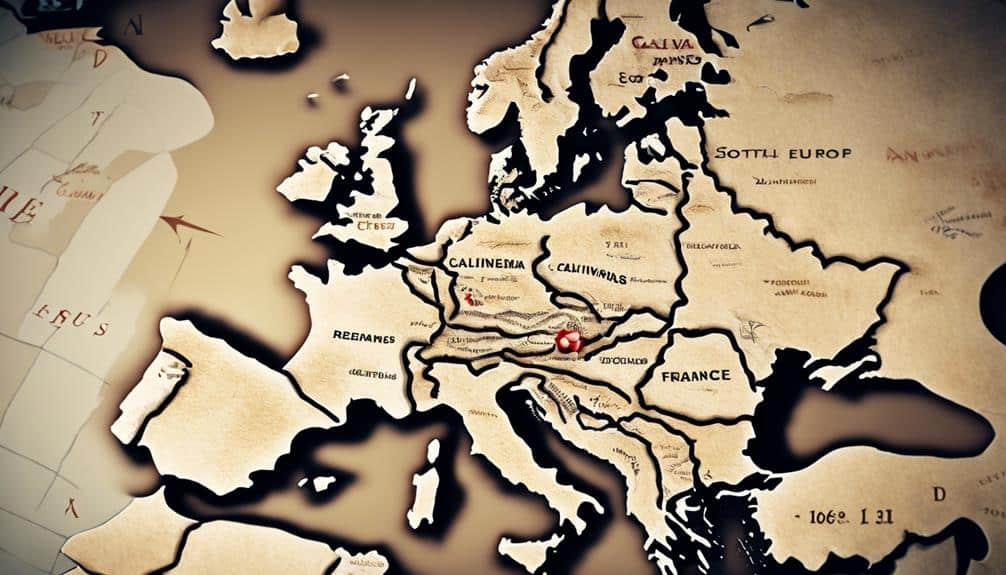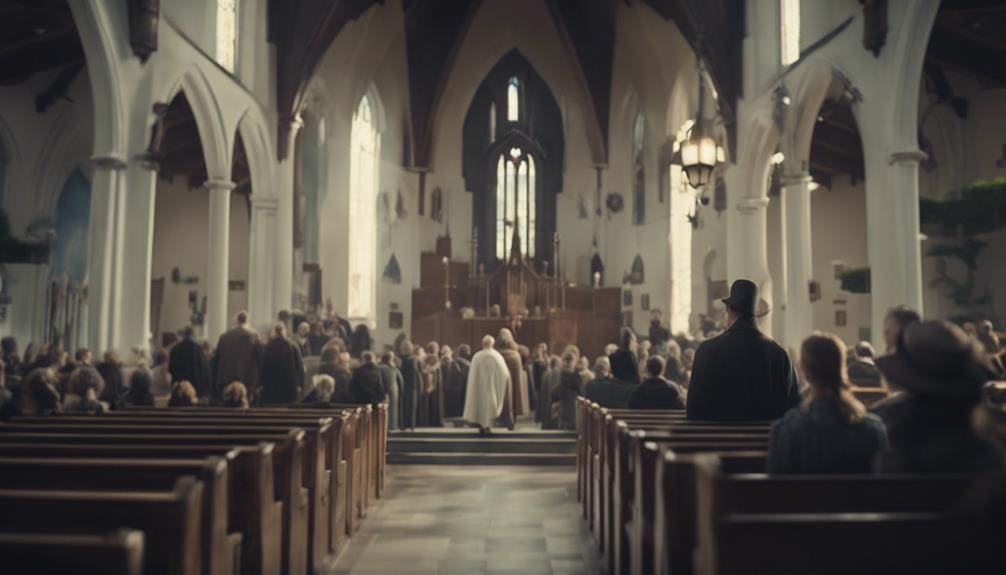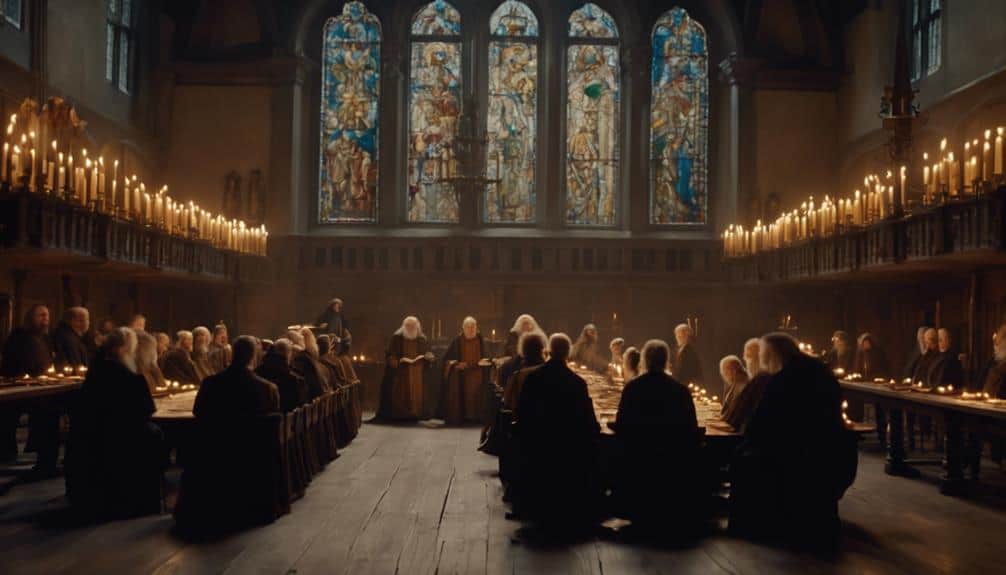Discover how John Calvin's groundbreaking ideas in 'Institutes of the Christian Religion' sparked the rise of Calvinism, challenging church hierarchies and reshaping Protestant Christianity.
Uncover the enduring impact of his doctrines, from predestination to the priesthood of all believers, that continue to influence theology and church governance today.
Origins and Development
John Calvin's revolutionary theological framework, which he first articulated in 'Institutes of the Christian Religion,' laid the foundation for the widespread influence of Calvinism across Europe and North America. At just 27 years old, Calvin's publication, known as Calvin's Institutio Christianae, became a seminal text during the Protestant Reformation. This work didn't just inform but actively propelled the spread of Calvinism, shaping the Reformed churches that would arise in England, Scotland, France, the Netherlands, and North America.
Geneva became a pivotal hub for this movement, where Calvin trained ministers who then disseminated his ideas far and wide. The theological evolution sparked by Calvin's teachings led to variations within Calvinism itself, reflecting diverse interpretations and practices. Despite these differences, the core tenets as laid out in the 'Institutes of the Christian Religion' remained influential, guiding the doctrinal foundations of many Protestant denominations.
Calvin's legacy endures, with his theological concepts still studied and debated today. His impact on Protestantism is undeniable, demonstrating the lasting power of his revolutionary ideas in shaping the religious landscape of the Western world.
Key Theological Ideas

Building on the historical impact of Calvin's work, his key theological ideas, particularly the sovereignty of God and predestination, form the cornerstone of Calvinist doctrine. John Calvin's teachings assert that God's supreme authority governs all aspects of existence, reinforcing the belief that God's will is absolute and unchangeable.
Central to Calvinism is the doctrine of predestination, which posits that God has preordained the salvation or damnation of every soul, emphasizing a divine plan beyond human control.
Calvinism also champions salvation by grace through faith alone, rejecting the Catholic notion of salvation through works. This doctrinal shift underscores the authority of Scriptures as the ultimate guide for faith and practice. Calvin's radical ideas facilitated the formation of Reformed churches and had a profound influence on various Protestant denominations worldwide.
Moreover, Calvin's concept of the priesthood of all believers challenged the hierarchical structure of the Catholic Church, advocating that every Christian has direct access to God without ecclesiastical mediation. His emphasis on personal piety, discipline, and strict adherence to biblical principles marked a sharp departure from Roman Catholic practices, fostering a culture of individual spiritual responsibility.
These foundational ideas continue to resonate within Reformed churches and broader Protestant traditions today.
Spread of Calvinism

From its origins in Geneva, Calvinism rapidly spread across Europe and beyond, profoundly shaping the theological and ecclesiastical landscapes of numerous regions. Geneva emerged as a pivotal hub for training ministers and disseminating Calvinism, ensuring its doctrines reached far and wide. This city became synonymous with the Reformed tradition within Protestant Christianity, playing a significant role in its expansion.
You'll find that Calvinism spread extensively to England, Scotland, France, the Netherlands, and North America. The establishment of Reformed Churches in Switzerland and southern Germany further solidified its influence. The rigorous training of ministers in Geneva made sure that Calvin's ideas were systematically propagated, leading to a significant impact on various Protestant denominations.
As Calvinism spread, it didn't merely transplant religious practices; it reshaped the theological landscape of the regions it touched. The doctrines and ecclesiastical structures rooted in Calvin's teachings introduced new paradigms within Protestant Christianity.
Consequently, the spread of Calvinism facilitated a global influence that extended beyond Europe, embedding itself in the fabric of numerous Protestant denominations worldwide. The Reformed tradition, as nurtured in Geneva, remains a testament to Calvinism's enduring and extensive reach.
Impact on Modern Protestantism

Calvinism's enduring influence on modern Protestantism is unmistakably evident in the doctrinal foundations and ecclesiastical structures of denominations such as Presbyterian and Reformed Churches. John Calvin's impact on modern Protestantism is profound, particularly through his emphasis on predestination and salvation by grace, which continue to shape theological discussions. Calvinist doctrines—total depravity, unconditional election, limited atonement, irresistible grace, and perseverance of the saints—form the bedrock of much of Protestant theology today.
The sovereignty of God, a central tenet in Calvinism, has led to a distinctive approach to church governance. Presbyterian and Reformed Churches, for example, adopt a representative system of governance where elders play a significant role, reflecting Calvin's vision of a disciplined, orderly church structure. This system underscores the belief in God's supreme authority over all aspects of life and faith.
Moreover, Calvinism's principles aren't confined to these denominations alone; they've permeated the wider Protestant landscape, influencing beliefs, practices, and the overall theological framework. Modern Protestantism, with its rich diversity, still resonates with the radical ideas introduced by Calvin, ensuring his enduring legacy in shaping the faith.
Predestination and Doctrine

John Calvin's doctrine of predestination, asserting that God has predetermined each individual's salvation or damnation, underscores the profound theological emphasis on divine sovereignty within modern Protestantism. Calvin's theology posits that God, in His omniscience, has already decided who'll be saved and who'll be damned, a concept known as double predestination. This doctrine not only highlights God's ultimate control over salvation but also minimizes the role of human agency in the process.
Understanding Calvin's predestination doctrine helps you appreciate the depth of his theological insights and the significant impact on Protestant thought. It brought about numerous controversies, as it questioned the traditional views of human agency and divine justice.
- Divine Sovereignty: Calvin's theology stresses that God's will is the ultimate determinant in matters of salvation and damnation.
- Double Predestination: Calvin's concept asserts that God has chosen some for salvation and others for damnation, reflecting His absolute authority.
- Human Agency: The doctrine challenges the notion that human actions can influence one's spiritual fate, sparking theological controversies.
This intricate balance of God's sovereignty and human responsibility remains a cornerstone in Calvinist theology, influencing various Protestant denominations to this day.
The Synod of Dort

At the Synod of Dort, you'll find that the Calvinist doctrine of predestination was rigorously clarified, particularly against the Remonstrant position.
This gathering of international representatives from Reformed churches underscored the sovereignty of God in salvation, culminating in the affirmation of the five points of Calvinism, known as TULIP.
The Synod's decisions not only resolved local theological disputes but also profoundly influenced the development of Calvinist theology for centuries.
Predestination Doctrine Clarified
The Synod of Dort, convened in 1619, decisively clarified the doctrine of predestination, underscoring its pivotal role in Reformed theology and its enduring influence on Protestant thought. Building on John Calvin's radical ideas, the Synod sought to address the theological controversies that had roiled Reformed churches.
By reaffirming Calvinist beliefs, the Synod provided theological clarity and solidified the predestination doctrine as a cornerstone of Calvinism.
As you explore the significance of the Synod's rulings, consider the following key outcomes:
- Solidification of Calvinist Beliefs: The Synod of Dort reaffirmed the doctrine of predestination, emphasizing God's sovereign choice in the salvation of individuals, thereby strengthening the core of Calvinist beliefs.
- Impact on Protestant Thought: The Synod's decisions influenced broader Protestant thought, shaping the theological landscape and reinforcing the distinctiveness of Reformed churches.
- Resolution of Theological Controversies: By addressing disputes surrounding predestination, the Synod provided a unified doctrinal stance, mitigating divisions within the Calvinist community.
The Synod of Dort's resolutions not only settled immediate theological disputes but also left a lasting legacy on Reformed theology. By clarifying the predestination doctrine, it guaranteed that Calvinism remained a coherent and influential force within Protestantism, aligning closely with John Calvin's original radical ideas.
International Church Representation
Representatives from Reformed churches across Europe gathered at the Synod of Dort, underscoring its international significance and the collective effort to address theological disputes. Convened in the Netherlands from 1618-1619, the Synod sought to resolve critical issues within the Dutch Reformed Church, particularly those arising from Arminianism's challenge to predestination.
John Calvin's teachings on predestination and salvation faced scrutiny, prompting a need for doctrinal clarity. The Synod of Dort brought together theologians from various regions, reflecting a unified Reformed theology. These international delegates underscored the collective nature of the Reformed tradition, emphasizing the importance of a cohesive theological stance.
At the Synod, the Calvinist position on predestination was robustly defended and reaffirmed, countering Arminian perspectives that emphasized human free will in salvation. The Synod's conclusions not only resolved local theological disputes but also had far-reaching implications, shaping the trajectory of Calvinism globally.
Controversies and Opposition

Calvin's rigorous enforcement of religious laws in Geneva ignited significant opposition and controversy, particularly over his treatment of dissenters and heretics. His unwavering stance on doctrinal purity and moral discipline often clashed with more moderate views on religious tolerance. Key controversies emerged, shaping the discourse around Calvinism and its radical ideas.
The Servetus Affair:
The execution of Michael Servetus for heresy remains a critical point of contention. Calvin's involvement in this incident illustrated his uncompromising stance against perceived theological threats.
Criticism from Sebastian Castellio:
Castellio, a notable critic, argued for greater religious tolerance and vehemently opposed Calvin's authoritarian methods. His writings challenged the moral and ethical foundations of Calvin's actions.
Internal Conflicts in Geneva:
Calvin's strict application of religious laws led to significant internal strife. Many citizens and fellow reformers resisted his efforts, highlighting the tension between religious authority and individual freedoms.
These controversies underscore the complexities of Calvinism's rise in Geneva. While Calvin's radical ideas attracted a devoted following, they also provoked substantial opposition. His handling of dissenters and heretics, epitomized by the Servetus affair, remains a contentious aspect of his legacy, reflecting the broader struggle over religious tolerance within the Reformation.
Calvin's Enduring Legacy

You can observe Calvin's lasting legacy in the pervasive influence of his teachings on modern Protestantism, particularly through the doctrines of predestination and salvation by grace.
His ideas on church governance, which emphasize a decentralized and egalitarian structure, have profoundly shaped Presbyterian and Reformed traditions.
The Academy of Geneva further solidified his impact by training generations of Protestant leaders who propagated Calvinist principles globally.
Influence on Modern Protestantism
John Calvin's radical ideas have profoundly shaped the theological landscape of modern Protestantism, particularly through his doctrines of predestination and salvation by grace through faith. His influence is unmistakably evident in Reformed churches, Presbyterian denominations, and various branches of Protestantism. Calvin's rigorous theological framework has provided the foundation for numerous modern Protestant beliefs, reflecting his enduring legacy.
Calvin's separation of church and state remains a cornerstone of modern Protestant thought. By advocating for distinct roles, Calvin secured that religious and governmental spheres could coexist without overstepping boundaries. This principle has facilitated the flourishing of Protestantism in diverse socio-political contexts.
His global influence stretches across cultures and societies, reinforcing the universality of his doctrines. Calvin's teachings on predestination and salvation by grace continue to resonate, offering a robust theological foundation for contemporary believers. The relevance of Calvin's ideas is seen in the ongoing discussions within Protestant circles, highlighting his impact on modern thought.
- Predestination: Central to Calvin's theology, shaping views on divine sovereignty and human agency.
- Salvation by grace: Emphasizes faith over works, a cornerstone of Protestant soteriology.
- Church and state: Calvin's advocacy for their separation remains influential in maintaining religious freedom.
Thus, Calvin's radical ideas have left an indelible mark on Protestantism worldwide.
Predestination's Lasting Impact
The doctrine of predestination, with its focus on God's absolute sovereignty, has fundamentally shaped Protestant theological discourse and continues to provoke deep reflection on the nature of salvation and human agency.
John Calvin's articulation of predestination emphasized that God alone determines who'll be saved, underscoring God's supreme control over all aspects of existence, including human destiny. This concept became a cornerstone of Calvinism, distinguishing it as a distinct theological tradition within Protestantism.
Calvin's teachings on predestination sparked extensive debates and controversies within the Protestant community. These theological discussions revolved around the tension between divine sovereignty and human agency. By asserting that salvation is entirely a matter of God's will, Calvin challenged traditional views on human free will and moral responsibility. This tension remains a central issue in Christian thought, fueling scholarly inquiry and doctrinal development for centuries.
Moreover, the lasting impact of Calvin's doctrine of predestination extends beyond theological discussions. It profoundly influenced the beliefs and practices of many Protestant followers, shaping their understanding of God's role in salvation and their own spiritual lives. Through predestination, Calvin left an enduring legacy that continues to define and refine Protestant theology today.
Calvinist Church Governance
Calvin's methodical approach to church governance established a hierarchical framework that has profoundly influenced the organizational structure of Reformed and Presbyterian churches worldwide. His ecclesiastical code meticulously delineated roles within the church, creating a structured hierarchy that separated the clergy from the laity. In Geneva, Calvin implemented a model that included pastors, teachers, lay elders, and deacons, each with specific responsibilities, ensuring a balanced church government.
The Reformed churches, deeply influenced by Calvinist principles, adopted this model, which has since become a cornerstone of their church organization. Calvin's authority in ecclesiastical matters often led to tensions with secular authorities, underscoring the significant control he exerted over church government. This structured hierarchy not only facilitated effective church governance but also established a clear division between ecclesiastical and secular powers.
- Emphasized the role of lay elders in church governance.
- Implemented a balanced power structure to prevent clerical dominance.
- Ensured that church governance was distinct from secular authority.
Calvin's enduring legacy in church governance remains evident in the organization of Reformed and Presbyterian churches, highlighting his impact on Protestant ecclesiology. His ecclesiastical code continues to shape the roles and responsibilities within these denominations, promoting a well-defined and functional church government.


